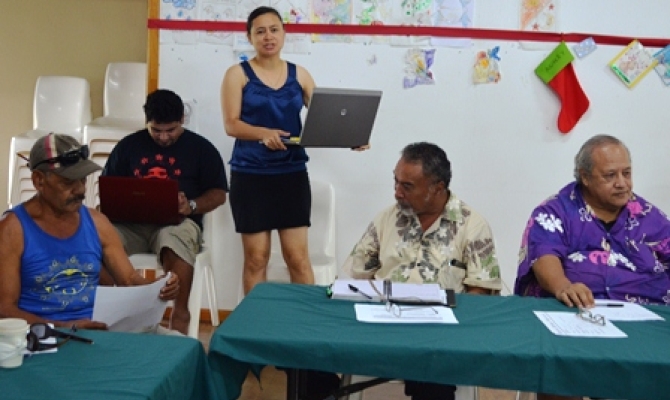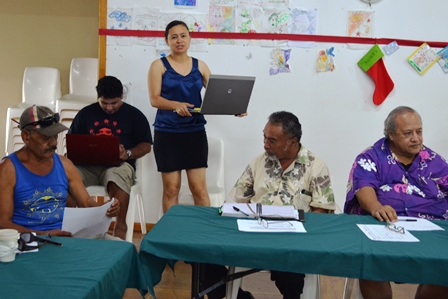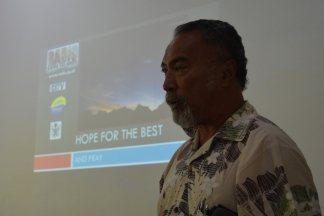
Climate Change Resilience
Rarotonga, Cook Islands, 4 March, 2015 - The Secretariat of the Pacific Regional Environment Programme (SPREP) is in the Cook Islands this week helping local broadcasters to keep safe and stay 'on air' during times of disasters.
The Cook Islands is one of eight countries that are the focus of a project funded by the Pacific Media Assistance Scheme (PACMAS). It is coordinated by the Secretariat of the Pacific Regional Environment Programme (SPREP) in partnership with the Secretariat of the Pacific Community (SPC).
 Jeane Matenga, CEO of the Pitt Media Group addressing the workshop
Jeane Matenga, CEO of the Pitt Media Group addressing the workshop
A range of training activities and meetings to help develop a National Broadcast and Climate Disaster Resilience Plan is underway, which will guide the preparation of organisational plans for local broadcasters.
"Media play a crucial role in disaster risk management from awareness, mitigation preparedness and response. This workshop will hopefully help develop collaboration between EMCI and our local media to respond effectively," said Mr. Charles Carlson, Director of Emergency Cook Islands (EMCI).
"It is very important to have a national umbrella plan in place to provide a clear structure of communication in times of disasters. We'll then work with the different broadcasters to develop their own organisational plan that will link to this."
 George Paniani, aka Captain G of Radio Cook Islands shares his experiences working 12 hour shifts
George Paniani, aka Captain G of Radio Cook Islands shares his experiences working 12 hour shifts
in times of floods, cyclones and tsunami warnings on radio
A draft Broadcast Climate and Disaster Resilience Plan will be provided to the broadcasters who will then work with the facilitators to develop it to a final draft for approval. This training will be supported with a simulation activity to strengthen understanding of the plan and will include training for local reporters on climate change and disasters.
The team will specifically work with the Pitt Media Group to complete their draft organisational plan as the national broadcaster that reaches all of Rarotonga and the whole of the Cook Islands.
"We are keen to work with local media in the Cook Islands as we believe they not only play a key role to help share information in times of disasters, but they also help to shape development choices that will impact on disaster resilience as the links between climate change and disasters grow stronger each year," said Dr. Netatua Pelesikoti, the Director of the Climate Change Division of SPREP.
Other countries that have completed draft plans and standard operating procedures as part of this project include Samoa, Palau and Tuvalu with Kiribati, Vanuatu, Solomon Islands and Tonga yet to be visited this year.
The training activities are from 3 – 6 March in Rarotonga, Cook Islands.
For more information please contact: Ms. Nanette Woonton
The Cook Islands is one of eight countries that are the focus of a project funded by the Pacific Media Assistance Scheme (PACMAS). It is coordinated by the Secretariat of the Pacific Regional Environment Programme (SPREP) in partnership with the Secretariat of the Pacific Community (SPC).
 Jeane Matenga, CEO of the Pitt Media Group addressing the workshop
Jeane Matenga, CEO of the Pitt Media Group addressing the workshopA range of training activities and meetings to help develop a National Broadcast and Climate Disaster Resilience Plan is underway, which will guide the preparation of organisational plans for local broadcasters.
"Media play a crucial role in disaster risk management from awareness, mitigation preparedness and response. This workshop will hopefully help develop collaboration between EMCI and our local media to respond effectively," said Mr. Charles Carlson, Director of Emergency Cook Islands (EMCI).
"It is very important to have a national umbrella plan in place to provide a clear structure of communication in times of disasters. We'll then work with the different broadcasters to develop their own organisational plan that will link to this."
 George Paniani, aka Captain G of Radio Cook Islands shares his experiences working 12 hour shifts
George Paniani, aka Captain G of Radio Cook Islands shares his experiences working 12 hour shifts in times of floods, cyclones and tsunami warnings on radio
A draft Broadcast Climate and Disaster Resilience Plan will be provided to the broadcasters who will then work with the facilitators to develop it to a final draft for approval. This training will be supported with a simulation activity to strengthen understanding of the plan and will include training for local reporters on climate change and disasters.
The team will specifically work with the Pitt Media Group to complete their draft organisational plan as the national broadcaster that reaches all of Rarotonga and the whole of the Cook Islands.
"We are keen to work with local media in the Cook Islands as we believe they not only play a key role to help share information in times of disasters, but they also help to shape development choices that will impact on disaster resilience as the links between climate change and disasters grow stronger each year," said Dr. Netatua Pelesikoti, the Director of the Climate Change Division of SPREP.
Other countries that have completed draft plans and standard operating procedures as part of this project include Samoa, Palau and Tuvalu with Kiribati, Vanuatu, Solomon Islands and Tonga yet to be visited this year.
The training activities are from 3 – 6 March in Rarotonga, Cook Islands.
For more information please contact: Ms. Nanette Woonton